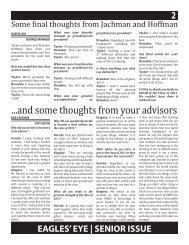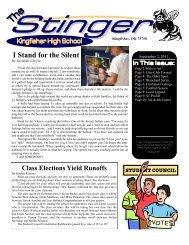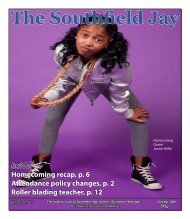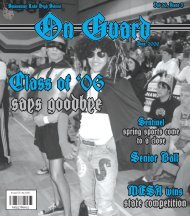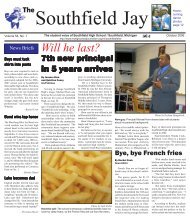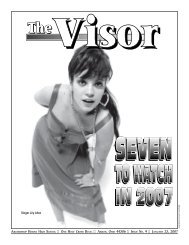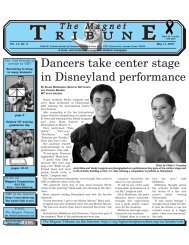School store to reopen ne tore to reopen ne tore to reopen next ...
School store to reopen ne tore to reopen ne tore to reopen next ...
School store to reopen ne tore to reopen ne tore to reopen next ...
You also want an ePaper? Increase the reach of your titles
YUMPU automatically turns print PDFs into web optimized ePapers that Google loves.
The Southfield Jay / December 2006<br />
‘Happ ‘Happy ‘Happ y holida holidays’ holida s’ is is o<strong>ne</strong>o<strong>ne</strong>-<br />
size-fits-mos<br />
size-fits-most size-fits-mos t greeting<br />
greeting<br />
As the song Carol of the<br />
Bells says, “O<strong>ne</strong> seems <strong>to</strong><br />
hear words of good cheer<br />
from everywhere, filling the air.”<br />
But should those words of good<br />
cheer be “Merry Christmas” or<br />
“Happy Holidays”?<br />
As the holiday season wears on,<br />
the date that is prevalent on the<br />
minds of most is Dec. 25 – Christmas.<br />
The day when billions of little<br />
kids (and some adults) wake up <strong>to</strong><br />
see what Santa Claus has left under<br />
the 6-foot evergreen tree for<br />
them, the tree that if it’s left up<br />
much longer, will keel over.<br />
Cus<strong>to</strong>m and common courtesy<br />
dictate that if a person says <strong>to</strong> you<br />
“Merry Christmas” that you say the<br />
same thing in kind <strong>to</strong> them. But isn’t<br />
that a little presumptuous? To pre-<br />
The Southfield Jay<br />
Published monthly<br />
by the journalism students<br />
of Southfield High <strong>School</strong><br />
in Southfield, Mich.<br />
Edi<strong>to</strong>r-in-Chief<br />
News Edi<strong>to</strong>r<br />
Centerspread Edi<strong>to</strong>r<br />
Edi<strong>to</strong>rial Edi<strong>to</strong>r<br />
Features Edi<strong>to</strong>r<br />
Sports Edi<strong>to</strong>r<br />
Entertainment Edi<strong>to</strong>r<br />
Fun Page Edi<strong>to</strong>r<br />
Pho<strong>to</strong> Edi<strong>to</strong>r<br />
Webmaster<br />
Staff Artist<br />
Circulation Manager<br />
Busi<strong>ne</strong>ss Manager<br />
Exchange Edi<strong>to</strong>r<br />
Faculty Adviser<br />
Jensen Allen<br />
Rachel Cook<br />
Erika Pritchett<br />
Justin S. Johnson<br />
Rae Larkins<br />
Emanuel Johnson<br />
Makia Brooks<br />
Kayla Hurst<br />
Josh Poli<strong>to</strong><br />
Justin S. Johnson<br />
Tiara Hill<br />
Mia Fleming<br />
Tomeka Kolleh<br />
Sahsha Daniel<br />
Dia<strong>ne</strong> Hofsess<br />
Staff writers: Sahsha Daniel, Personna<br />
Hover and Amber Lucy<br />
The Southfield Jay is a member of Quill<br />
& Scroll and the Michigan Interscholastic<br />
Press Association. The Jay is a 2004,<br />
2005 and 2006 George H. Gallup Award<br />
win<strong>ne</strong>r and a Spartan Award win<strong>ne</strong>r for<br />
2004, 2005 and 2006.<br />
We welcome your letters <strong>to</strong> the edi<strong>to</strong>r.<br />
Letters may be edited for space reasons.<br />
We do not print unsig<strong>ne</strong>d letters. Write <strong>to</strong><br />
us at The Southfield Jay, c/o Dia<strong>ne</strong><br />
Hofsess, Southfield High <strong>School</strong>, 24675<br />
Lahser Road, Southfield, Mich., 48033.<br />
Or pho<strong>ne</strong> us at (248) 746-8963.<br />
sume that somebody celebrates<br />
Christmas reeks of prejudice<br />
against them.<br />
There are millions of people<br />
who celebrate Hanukkah or<br />
Kwanzaa. They deserve <strong>to</strong> have<br />
their own holiday, without having<br />
“Merry Christmas” thrust upon<br />
them.<br />
Then there are the atheists who<br />
don’t celebrate Christmas or Hanukkah<br />
or Kwanzaa, for that matter.<br />
Having a merry Christmas is<br />
not an option <strong>to</strong> them because they<br />
don’t celebrate Christmas.<br />
Just as it is unacceptable <strong>to</strong> assume<br />
that a person who holds the<br />
door open for you will be celebrating<br />
Christmas, you can’t assume<br />
anything these days. It may seem<br />
like a completely innocent and<br />
Edit Edi<strong>to</strong>r Edit or orials or ials & & Opinions<br />
Opinions<br />
friendly gesture <strong>to</strong> say “Merry<br />
Christmas,” but you <strong>ne</strong>ver know<br />
who you’re going <strong>to</strong> offend, and<br />
you <strong>ne</strong>ver know how the other person<br />
will react <strong>to</strong> the assumption.<br />
It’s <strong>to</strong>o hard <strong>to</strong> ask everyo<strong>ne</strong><br />
which holidays they observe. So,<br />
the safest thing <strong>to</strong> say <strong>to</strong> people<br />
around the December holidays is<br />
the ge<strong>ne</strong>ric “Happy holidays.” It<br />
works. It’s simple, short, and nonspecific.<br />
And yes, as cold and unfeeling<br />
as it may seem, it’s better in this<br />
case <strong>to</strong> go for the all-inclusive and<br />
not the specific. Use “happy holidays,”<br />
and unless the person you’re<br />
greeting is a Scrooge, then they<br />
can’t but smile at you and return the<br />
favor.<br />
- Justin S. Johnson<br />
Letter <strong>to</strong> the edi<strong>to</strong>r<br />
Santa, it’s <strong>to</strong>o hard <strong>to</strong><br />
represent all the<br />
holidays. Can’t we just<br />
do Christmas?<br />
Passage Passage of of Proposal Proposal 2 2 w wwas<br />
w as a a shame<br />
shame<br />
On the Friday evening before the November<br />
election, I watched a documentary<br />
on the ABC <strong>ne</strong>ws program, 20/20, entitled,<br />
“Privilege in America: Who’s Shutting You<br />
Out?”<br />
O n e<br />
segment,<br />
“Education<br />
and Privilege,”exami<strong>ne</strong>d<br />
the<br />
question,<br />
“Are educations<br />
at<br />
elite colleges<br />
for<br />
By Karen Mel<strong>to</strong>n<br />
sale?” It<br />
was re-<br />
vealed that there are slots set aside at some<br />
of America’s <strong>to</strong>p colleges for those whose<br />
families have mo<strong>ne</strong>y, influence, and<br />
power—regardless of test scores or grade<br />
point averages. A former president of<br />
Duke University, Keith Brodie, admitted,<br />
“I believe that it is the case that there are a<br />
few slots in every entering class that are<br />
basically for sale.”<br />
Another segment, “Race and Privilege,”<br />
involved a hidden camera experiment<br />
where prospective employers were given<br />
two resumes with the exact same credentials<br />
and work experience—with o<strong>ne</strong> exception.<br />
The names were different. O<strong>ne</strong><br />
Happy<br />
Holidays<br />
name appeared <strong>to</strong> be more ethnic, possibly<br />
that of an African American, while the other<br />
name appeared <strong>to</strong> be that of a Caucasian person.<br />
Each time the experiment was repeated,<br />
the resume appearing <strong>to</strong> be that of a Caucasian<br />
was selected the by the employer. It was<br />
the same resume in each case, so undoubtedly<br />
the names had <strong>to</strong> be the deciding fac<strong>to</strong>r.<br />
After viewing this documentary, I was especially<br />
troubled. In just four days, Michigan<br />
voters would be going <strong>to</strong> the polls <strong>to</strong> vote<br />
for the future of Affirmative Action, better<br />
known as Proposal Two. Sadly the proposal<br />
passed. Those who were for the proposal feel<br />
that race and gender should not be a deciding<br />
fac<strong>to</strong>r as <strong>to</strong> who gets hired for certain jobs or<br />
admitted <strong>to</strong> certain colleges. In a perfect<br />
world, I would certainly agree, but as examples<br />
of flawed selection processes such as<br />
the o<strong>ne</strong>s presented by 20/20 and the myriad<br />
of others that exist, continue <strong>to</strong> show preferences<br />
for the privileged or reject qualified applicants<br />
on names alo<strong>ne</strong>, we still <strong>ne</strong>ed<br />
Affirmative Action <strong>to</strong> balance these wrongs.<br />
The really disturbing part about its passing<br />
is that many people, black and white, do<br />
not understand that Affirmative Action was<br />
<strong>ne</strong>ver meant for the undeserving or the unqualified.<br />
Students who don’t work hard <strong>to</strong><br />
earn good grades and test scores were <strong>ne</strong>ver<br />
going <strong>to</strong> be<strong>ne</strong>fit even with Affirmative Action<br />
in tact. Those who will be hurt most are the<br />
students who meet the qualifications, but can<br />
easily be pushed down on the list by a o<strong>ne</strong>or<br />
two- point deficit, which can come from<br />
various fac<strong>to</strong>rs, including the high school<br />
o<strong>ne</strong> attends, from what region o<strong>ne</strong> comes,<br />
whether the parents were alumni, or as in<br />
the 20/20 s<strong>to</strong>ry, how much o<strong>ne</strong>’s family can<br />
pay for a slot.<br />
There are those who would argue that<br />
more African American students <strong>ne</strong>ed <strong>to</strong><br />
step up, and I would certainly agree, because<br />
those who don’t will seal their own<br />
fates. While some African Americans enjoy<br />
comfortable lifestyles, there are many<br />
more who struggle every day <strong>to</strong> overcome<br />
obstacles, dysfunction and hardships, yet<br />
despite their struggles, they are smart, motivated<br />
and driven students who still manage<br />
<strong>to</strong> qualify for slots in good colleges and<br />
universities. Raw scores alo<strong>ne</strong> do not tell<br />
the s<strong>to</strong>ry. They’ve had <strong>to</strong> deal with and<br />
overcome much more in life while still<br />
maintaining their educational focus. These<br />
are the students who may be shut out because<br />
of less publicized quotas that favor<br />
where people live and how much financial<br />
influence o<strong>ne</strong>’s family has. They are the<br />
o<strong>ne</strong>s who be<strong>ne</strong>fit from Affirmative Action.<br />
The 20/20 documentary just underscored<br />
what African Americans have known all<br />
along. Discrimina<strong>to</strong>ry practices in employment<br />
and college acceptances still exist. regardless<br />
of the applicant’s qualifications.<br />
Mel<strong>to</strong>n teaches English at Southfield High.



